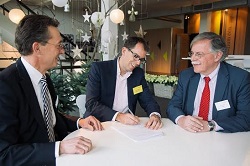ACADEMIA
Dutch universities start research using eCF
EXIN and the University of Applied Sciences Utrecht (HU) have joined forces in order to research the use of the e-Competence Framework (e-CF). This model provides a transparent and objective insight into ICT competencies. The research is led by Dr. Ing. Pascal Ravesteijn (Lectureship Process Innovation and Information Systems). This partnership and research were announced at the National Management & IT Symposium in Bussum (the Netherlands).
Research
 Both EXIN and the University of Applied Sciences Utrecht (HU) understand the importance of having a standard to determine the competencies of future ICT professionals. The e-Competence Framework is an important reference. The research will be conducted on quality criteria for comparing competency frameworks (such as the e-CF and the British SFIA), best practices in the use of the e-CF in business and the usability of the e-CF in education.
Both EXIN and the University of Applied Sciences Utrecht (HU) understand the importance of having a standard to determine the competencies of future ICT professionals. The e-Competence Framework is an important reference. The research will be conducted on quality criteria for comparing competency frameworks (such as the e-CF and the British SFIA), best practices in the use of the e-CF in business and the usability of the e-CF in education.
With the results of the research, the quality of education in ICT skills can be improved. In addition, services in the area of competence scans and assessments for organizations and individuals may further be improved. The e-CF research is funded by the EXIN Foundation, a shareholder of EXIN Holding BV.
EXIN and HU - leaders in applying the e-CF
The e-CF is growing in importance. In November 2015, the European Committee for Standardization (CEN) accepted the e-CF as the European Standard for defining ICT competencies. Government and more and more companies embrace the e-CF as a standard for the optimal development and deployment of their employees.
As an independent certification institute for professionals in the ICT domain, EXINhas already been involved in the development of the e-CF for years. EXIN has developed services (e-Competence Solutions) from the e-CF, such as assessments, skills gap analyzed and a profile builder.
HU is a forerunner in Dutch higher education in applying the e-CF for the purpose of an optimal connection between education and labor market needs.
